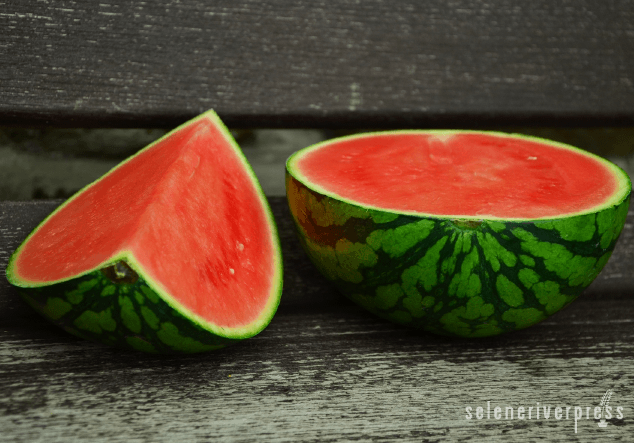Nothing makes me more giddy than walking up to the market entrance and seeing shopper after shopper hauling my favorite orb-shaped food to their vehicles. You know the one, all green and stripy on the outside and red and seedy on the inside. Yes, folks, the arrival of watermelon season is just one of Mother Nature’s (and your local farmer’s) gifts, if for no other reason than it’s hot outside. You’re the best, Mother Nature!
Whether it’s all cubed up with various other seasonal fruits or simply set out in solo wedges, this ever-present warm weather treat is typically the first to go at any summer cookout I’ve ever attended. Who can resist the juicy deliciousness of watermelon on a hot summer afternoon? No one, that’s who. Heck, on some of the hottest days of summer, the only thing that sounds good to eat is something cool and light—like watermelon. And since they’re more than 90 percent water, it makes perfect sense that watermelon season stretches over our thirstiest months of the year—May through August.
Did you know that even though eating watermelon can cause a river of sticky liquid to run down your forearm and drip off your elbow, they’re good for so much more? It’s true. Results from a recent study suggest that watermelon juice can help reduce muscle soreness after a workout. Who woulda thunk it? The amino acid L-citrulline, which is abundant in this red beauty, plays a role in determining how much your muscles will ache when you get more physical exertion than you’re used to. Now, this particular study discusses only watermelon juice, but I’d lean toward eating the entire fruit so I wouldn’t have to worry about a big ol’ sugar jolt to my system. After all, if L-citrulline is in the juice, it must be in the whole fruit as well. Right? Right.
The goodness doesn’t stop there though. Watermelon also supplies your body with:
- Vitamins A, C and B6, which are good for the eyes and the immune system, and also help break down the proteins we eat
- Lycopene, a phytochemical that’s great for the heart, skin, and prostate
- Cucurbitacin E, a compound known to reduce inflammation
Watermelon is worthy of our summertime admiration. To make them even easier to enjoy, here’s some simple know-how:
- Baffled about picking out the ideal watermelon each time? Look for a golden field spot (this is where the watermelon sat on the ground) and feel for an unexpected heft.
- Looking for a foolproof way to cut up your watermelon? The key is to peel it first.
- Don’t like wasting all of that watermelon rind? You can use it to make pickles!
- Curious about unique recipes with watermelon? It can be used in savory dishes as well!




I always grow them in our garden, but the yield’s not too hot. Hopefully this year we’ll get more than two! :)
I hope so too, Sam. I suppose 2 is better than 0 though, eh?! ;) Have you tried different varieties to see if it makes any difference?
True that, Paula! :) I’ll have to try some other varieties. I have one plant in the garden that is looking bigger than others in the past, so maybe we’ll get more this year.
I certainly hope that is the case, Sam. Happy watermelon eating to you!! :)
Thanks, Paula!